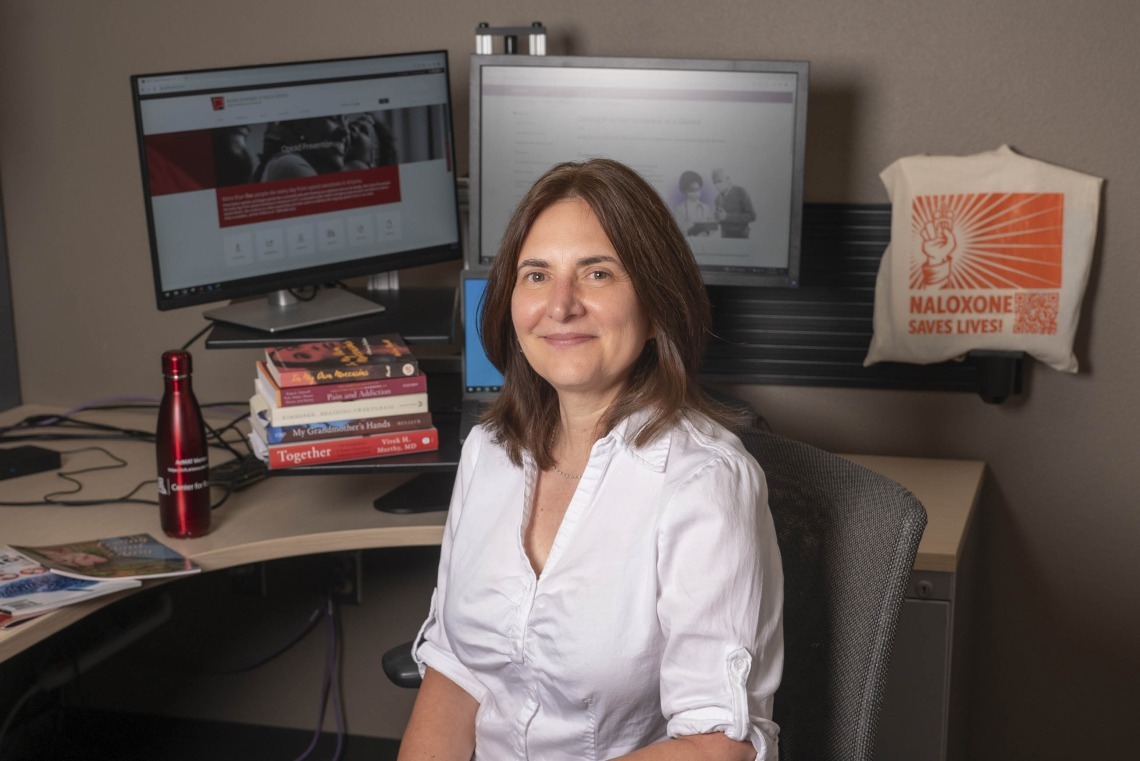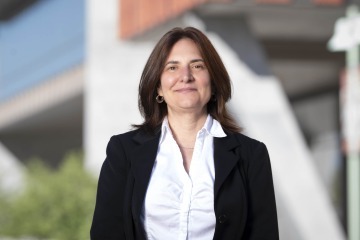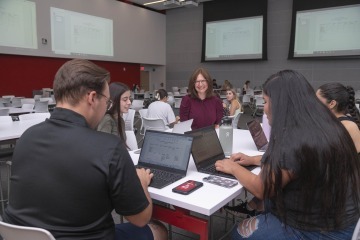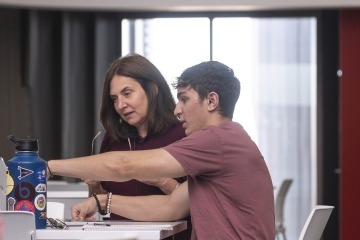Lived experience leads to unique educational approach
Bridget Murphy's struggles as a teen fuel her work to educate the next generation of health professionals on how to address substance use disorders.

Bridget S. Murphy, DBH, MEd, spent part of high school in treatment for substance abuse and shares her personal story with students as part of the undergraduate course “HPS 306, Drugs and Society.”
Bridget S. Murphy, DBH, MEd, was 12 when she started stealing cigarettes and swigs of liquor. Next, she moved to marijuana and speed. At 15, Murphy landed in rehab.
It’s not exactly the kind of personal information students expect to hear from a professor on the first day of class or read in a university biography. It wasn’t easy to put out such personal details for anyone to see, Murphy says, but it needed to be done.
“I really started making some intentional decisions about being honest about who I am and recognizing all the beauty in that, as well as the healing, and how I can use my experiences for good,” said Murphy, director of education and workforce research for the University of Arizona Health Sciences Comprehensive Pain and Addiction Center. “Hopefully, I provide hope to people that these things can happen, and they don’t define you — you can still make great contributions to the world or to science or to academics or to your community.”
Sharing a personal case study
An only child, Murphy moved across the country from a small Michigan town to northwest Tucson when she was 12. Under normal circumstances, middle school can be rough. For a depressed new kid trying to fit in, it was excruciating. Making matters worse, her mother and stepfather were headed toward divorce.
Her mom, who worked at a rehabilitation and treatment center, caught her drunk and sneaking out of the house in the middle of the night. Then, she ran away from home.The director of the facility where her mother worked offered to enroll Murphy. Far from a willing participant, she repeatedly begged to go home. When that didn’t work, she took matters into her own hands.
During a regular morning run five months into her 18-month stay, Murphy and another teen took off into the desert. It was a warm May morning when they wandered for nearly an hour before stumbling upon a convenience store. Partying with her old buddies was a payphone call away, and Murphy scored five days of freedom before she got caught. Her capture, though, paved the path to recovery.
“When we talk about the cycle of addiction or substance use disorders, this is part of the process,” she said. “And in fact, that probably made it better for me in terms of my growth. I almost needed to have that experience to really see that change was necessary and possible.”
Climbing out of the darkness
Slowly but surely, Murphy bought into the program. She credits her stint in treatment for turning around her academic career – the once lackluster student earned her GED and excelled in college and graduate school. It also gave her the tools she needed when, as an adult with a thriving professional career, she fell into old habits misusing alcohol with her then-husband.
“It was a dual life and totally incongruent with what my daily work life was or values that I communicated to others,” she said. “This incongruence was really eating at me.”
The marriage ended and the unfiltered honesty began.
“I think the bravest thing that I've done, and the thing that I'm most proud of, is healing myself and working toward that with the relationships that I have,” she said.
“I want to create spaces for people to be who they are."
—Bridget S. Murphy, DBH, MEd
That means being open about the past.
“There’s so much stigma that exists and that’s another reason why I do put it out there, to help address that stigma,” she said. “It’s been such a hidden, secretive, shameful condition and it doesn’t have to be.”
Finding her purpose in teaching
More than five people a day die from opioid overdoes in Arizona, according to the Arizona Department of Health Services. Nationally, drug overdose deaths are at an all-time high. More than 104,000 Americans died due to drug overdose in the 12-month period ending in September 2021, according to the Centers for Disease Control and Prevention.
Murphy tweaked the curriculum, changing the text, assignments and objectives to focus on substance use disorder as a public health concern. She wanted to address the stigma as well as the full continuum of care – prevention, harm reduction, treatment and recovery.
“Ultimately, the goal is to provide students with a learning experience that examines the public health relevance of substance use, misuse and addiction using science, research, interactive assignments and lived experience,” said Murphy, who is the faculty lead for addiction and substance use certificate and minor programs developed in the Zuckerman College of Public Health with the support of the Comprehensive Pain and Addiction Center. “My personal teaching goal is that at least one student each semester will be inspired to learn more and pursue a career in substance use prevention, harm reduction, treatment or recovery.”
Todd Vanderah, PhD, founding director of the Comprehensive Pain and Addiction Center, praised Murphy’s positive attitude and how she strives to help others.
“Bridget is a colleague who works hard and thoughtfully by connecting with other faculty, staff and students,” said Vanderah, Regents Professor and head of the Department of Pharmacology at the UArizona College of Medicine – Tucson. “Her lived experience brings tremendous insight to our needs for the center while bringing perspective to issues that we may not have considered.”
Her thoughtful approach resonates with her students; this past spring, they nominated her for the W.A. Franke Honors College’s Margaret M. Briehl and Dennis T. Ray Five Star Faculty Award that recognizes excellence in teaching and mentoring.
Murphy is proud of her work, but it is not her main goal in life.
“I think what I want to be known for is being kind,” she said. “I want to create spaces for people to be who they are, wherever they are, in whatever format they want to be in, and to be kind and supportive of others as well as being kind to myself.”




